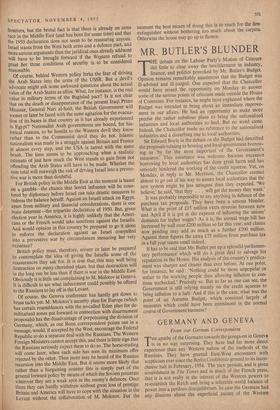, GERMANY AND GENEVA
From our German Correspondent
HE apathy of the Germans towards the goings-on in Geneva is in no way surprising. They have had far more direct experience than any Western nation of the methods of the Russians. They have greeted East-West encounters with scepticism ever since the Berlin Conference ground to its incon- clusive halt in February, 1954. The view persists, and is given nourishment in The Times and in much of the French press, that it is not really in the interest of the Western powers to re-establish the Reich and bring a tolerable world balance of power into a perilous disequilibrium. In case the Germans had any illusions about the superficial nature of the Western countries' declarations that they had made the cause of German unity their own, these were shattered by the reactions in the West, and particularly in Britain, to the Saar plebiscite. British bitterness about the Saar has induced at least one large news- paper, Der Mittag, to conclude that Germany must be prepared to 'go it alone' with the Soviet Union.
This is not the view of Dr. Adenauer. But Dr. Adenauer is sick and there seems to be some doubt as to whether he will return to his duties before next year. The country is sorely in need of a strong hand in moments of hesitation like this, and although Herr von Brentano is showing that he has a stronger influence on the governing machine than anyone had suspected, the struggle for Adenauer's succession has not yet come into the open. When it does, and that may be soon now, there may well be a candidate who can offer the country a Coalition of National Unity—alliance with the Social Democrats, less acient bn the Atlantic Pact and more accent on a dialogue with the Soviet Union.











































 Previous page
Previous page